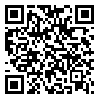BibTeX | RIS | EndNote | Medlars | ProCite | Reference Manager | RefWorks
Send citation to:
URL: http://ijme.tums.ac.ir/article-1-5524-en.html
2- Department of Psychology, Payame Noor University, Iran
3- Department of Social Science, Payame Noor University, Iran
Social and moral intelligence can enhance nurses’ amenability and affect their professional performance in treatment settings, where there is considerable personality and individual diversity. The aim of this research is to investigate the relationship between nurses' social and moral intelligence, and their attitude to patient education. This was a descriptive-analytic correlation study conducted on a statistical sample of 200 nurses selected from West Azerbaijan province during 2014 using the Cochran formula and cluster sampling. Lennick & Kiel’s Moral Competency Inventory, Thet’s Social Intelligence Scale and a researcher-compiled questionnaire on nurses' attitude to patient education were used for data collection. The data were analyzed by Pearson’s correlation coefficient and multiple regression analysis. A positive relationship was found between nurses' attitude to patient education and the social intelligence variable (r=0.422, P=0.001), subscale integrity (r=0.554, P=0.001) subscale responsibility (r=0.292, P=0.001), subscale forgiveness (r=0.283, P=0.002) and subscale compassion (r=0.353, P=0.001) of moral intelligence. The results of multi-variable correlation coefficient using input method indicated that social intelligence and the subscales of moral intelligence influence nurses' attitude to patient education (R2 = 0.426). Patient education is among the main responsibilities of nurses. The results of this study showed that there is a positive and significant relationship between social intelligence and the subscales of moral intelligence, and nurses’ attitude to patient education. It is therefore necessary to improve nurses’ social and moral intelligence through group training in order to enhance their educational role.
Received: 2015/05/6 | Accepted: 2015/05/6 | Published: 2015/05/6
| Rights and permissions | |
 |
This work is licensed under a Creative Commons Attribution-NonCommercial 4.0 International License. |





